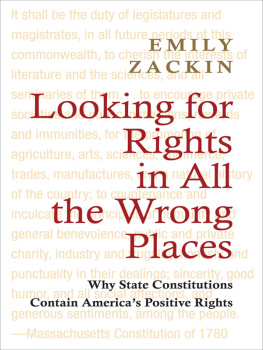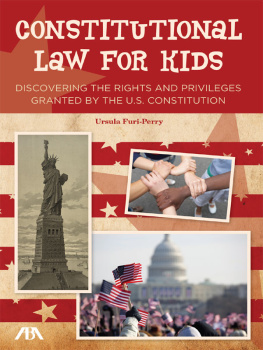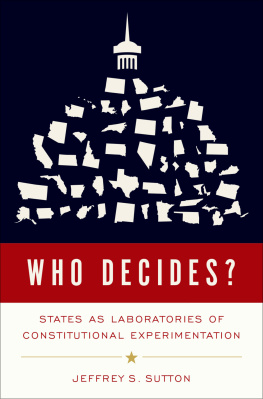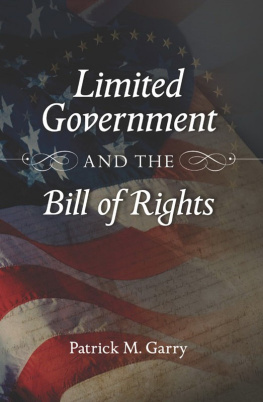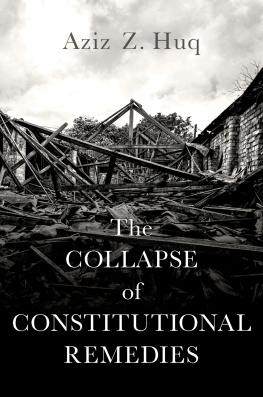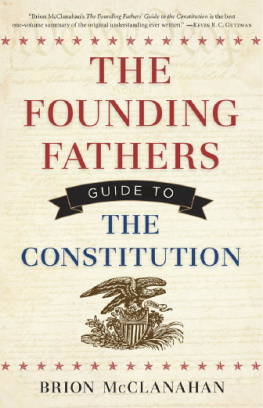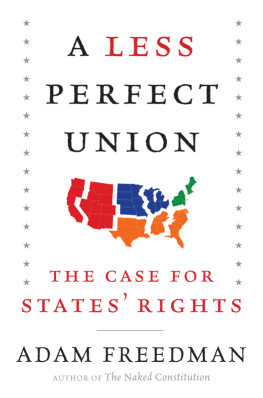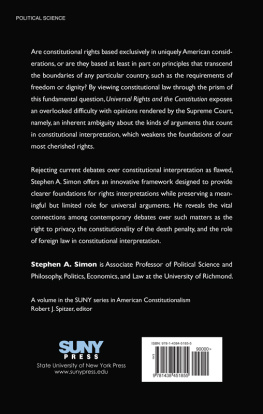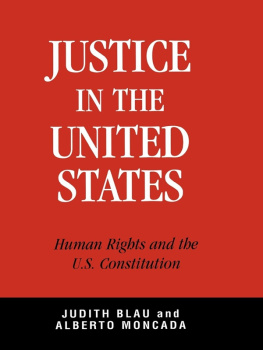
Looking for Rights in All the Wrong Places

PRINCETON STUDIES IN AMERICAN POLITICS
HISTORICAL, INTERNATIONAL, AND COMPARATIVE PERSPECTIVES
Ira Katznelson, Martin Shefter, and Theda Skocpol, Series Editors
A list of titles in this series appears at the back of the book.
Looking for Rights in All the Wrong Places
WHY STATE CONSTITUTIONS CONTAIN AMERICAS POSITIVE RIGHTS

EMILY ZACKIN
PRINCETON UNIVERSITY PRESS
PRINCETON AND OXFORD
Copyright 2013 by Princeton University Press
Requests for permission to reproduce material from this work should be sent to Permissions, Princeton University Press
Published by Princeton University Press, 41 William Street,
Princeton, New Jersey 08540
In the United Kingdom: Princeton University Press, 6 Oxford Street,
Woodstock, Oxfordshire OX20 1TW
press.princeton.edu
All Rights Reserved
Library of Congress Cataloging-in-Publication Data
Zackin, Emily J., 1980
Looking for rights in all the wrong places : why state constitutions contain Americas positive rights / Emily Zackin.
p. cm. (Princeton studies in American politics : historical, international, and comparative perspectives)
Includes bibliographical references and index.
ISBN 978-0-691-15577-7 (hardcover : alk. paper) ISBN 978-0-691-15578-4 (pbk. : alk. paper)
1. Civil rights United StatesStates. 2. Constitutional lawUnited StatesStates. I. Title.
KF4750.Z95Z33 2013
342.7308'5dc23
2012041106
British Library Cataloging-in-Publication Data is available
This book has been composed in Sabon
Printed on acid-free paper.
Printed in the United States of America
1 3 5 7 9 10 8 6 4 2
CONTENTS

ACKNOWLEDGMENTS

T his book grew out of my dissertation project, and it is a testament to my remarkably good fortune in teachers, friends, and family.
I am deeply indebted to each member of my thesis committee. Its chair, Keith Whittington, was the first to suggest that I read state constitutions, and has since spent countless hours discussing them with me. Keiths assiduity, encyclopedic knowledge, and incisive vision have immeasurably strengthened this work and all of my scholarship. Paul Frymer has consistently steered me toward big and meaningful questions, and served as an endless source of new ideas, support, and advice. I could not have written this without him. While working on her own book about state constitutions, Amy Bridges not only encouraged me to pursue this project, but also shared her exhaustive research, unique expertise, and considerable insights. Over the course of several years and many drafts, and from all the way across the country, Amy has given me invaluable guidance. Last, but certainly not least, I was privileged to have Kim Scheppele serve on my committee. Beginning with my first days of graduate school, Kim has urged me to think across disciplinary boundaries, offered ingenious suggestions about my research, and championed my work with boundless energy. I do not know what I would do without her. Thank you, all.
Ive also benefitted from the generosity and counsel of many scholars who, unlike the members of my thesis committee, were under no obligation to read this. Sandy Levinson read several drafts, made crucial interventions, and went out of his way to provide venues in which I could present this research. Richard Bensel volunteered to read an even earlier draft of the entire project, and sent me extraordinarily thoughtful, comprehensive, and useful feedback on each chapter. I will not try to list all of the people who have offered me their help, since that does not seem possible, but Mark Graber, William Forbath, John Dinan, Chuck Epp, Dirk Hartog, Eric Lomazoff, Eileen McDonagh, Ken Kersch, Tali Mendelberg, Jessica Trounstine, Julie Novkov, and Jack Balkin have all played particularly important roles in pushing my thinking forward and encouraging me along the way.
Debbie Becher, my writing buddy, has been intimately involved in my efforts to revise what was a dissertation into a book, and has solved many of the manuscripts most challenging problems. Debbies willingness to reread and rework each chapter, her keen analysis, and sophisticated thinking have dramatically improved this book. I am not sure it would even exist without her. I am also very grateful to Justin Crowe, Megan Francis, and Melody Crowder-Meyer, who were helpful at every stage of the book-writing process, in every way possible. Few people can boast such brilliant classmates or such generous and devoted friends. Through their endless support, Debbie, Justin, Megan, and Melody ease the difficulties of academic life and amplify its joys.
Princeton librarians David Hollander and Elizabeth Bennett worked with me to uncover obscure primary sources and state court opinions. I depended on them completely, and on the heroic efforts of the staff at the interlibrary loan office. Amanda Irwin Wilkins, who directs the Princeton Writing Center, taught me how to work productively, how to teach writing, and how to believe that I really might finish my dissertation. I still miss our afternoon chats.
I am also indebted to Chuck Myers at Princeton University Press for his interest in my project, and for shepherding it (and me) through the publication process. I appreciate the work and time of the anonymous reviewers, whose criticism enhanced the argument here, as well as the careful attention of copyeditor Karen Verde. My new colleagues at Hunter College have been universally welcoming and helpful as I finished this manuscript and began teaching, and Aaron Greller provided truly excellent research assistance.
I developed many of the ideas in this book during my year as a fellow at the University of Virginias Miller Center for Public Affairs, where Sid Milkis and Brian Balogh were extraordinarily helpful and kind. I continue to appreciate their generosity and guidance and to emulate their scholarship. My class of Miller Center fellows was also quite stimulating, and Tom Burke, my Miller Center dream mentor, deserves the title. The opportunity to participate in the Fellowship of Woodrow Wilson Scholars at Princeton, and to present this work to the other fellows under the warm and rigorous leadership of John Darley, helped me to refine and improve my argument.
My undergraduate professors at Swarthmore College have nurtured and challenged me from my very first forays into academic thinking. Scott Gilbert, Carol Nackenoff, Ken Sharpe, and Rick Valelly remain cherished mentors. I am also indebted to the friends Ive known since long before I started this project. Their contributions to my life extend well beyond this book, but Paul Asman, Parag Butala, Judy Chen, Rachel Fershleiser, Marta Johnson, Gil Jones, Kwindla Kramer, Nina Kurvilla, Katie Tunning, Tiffany Lennon, Jill Lenoble, Nisha Mehta, Matthew Oransky, Amanda Schneider, and Renee Witlen all helped me through the challenges of writing it.
My parents and sister have expressed their unqualified belief in my abilities for as long as I can remember. Their commitment to learning and their enjoyment of ideas have shaped me and inspired my scholarship. I am often reluctant to show them my work, but I always strive to write for an audience possessed of their clarity of thought and soundness of judgment.
For the past ten years, Roban Kramer has been my partner in all things, including this project. I rely on his loving care and supreme competence, and aspire to his kindness, intellectual curiosity, and wisdom. It is my profound pleasure to go through life with him, and to share that life with the many others who helped me write this.
Next page
